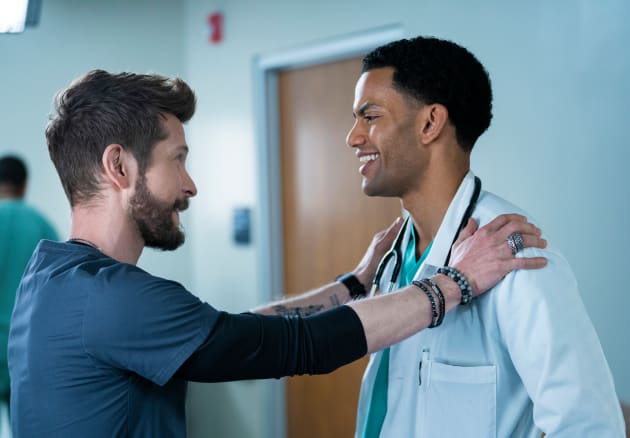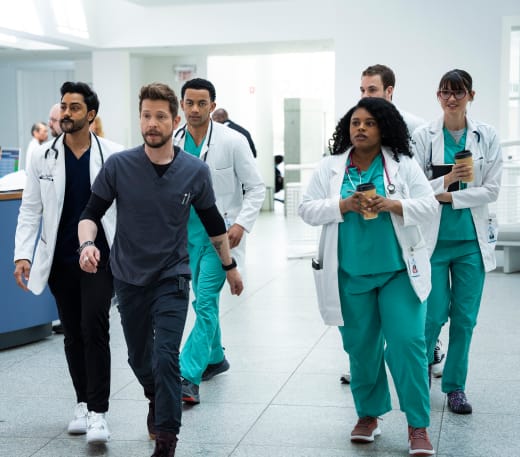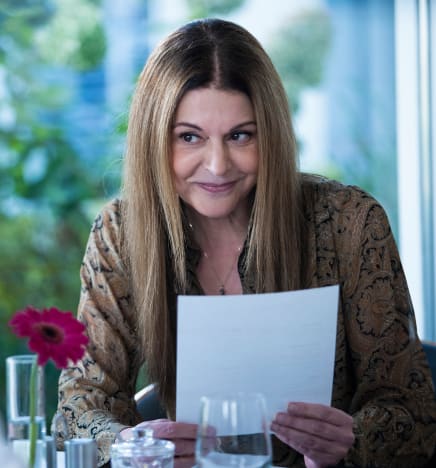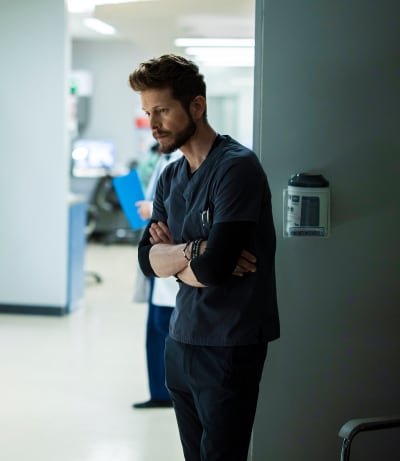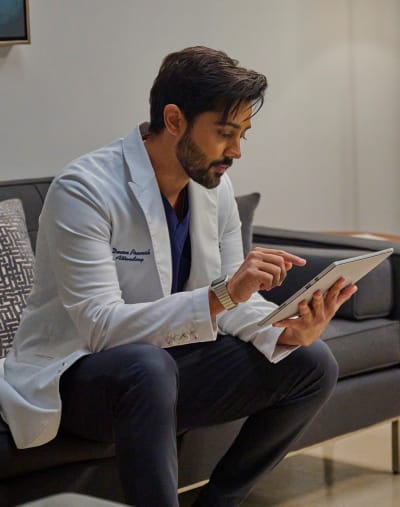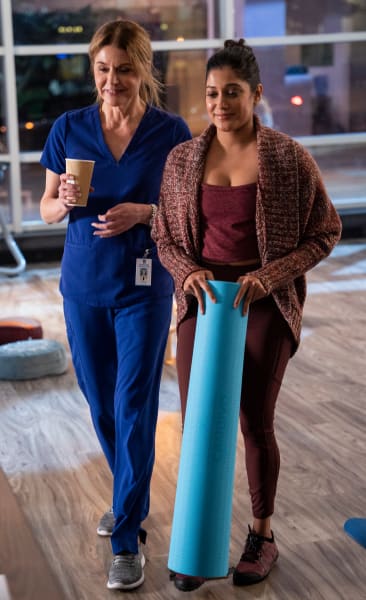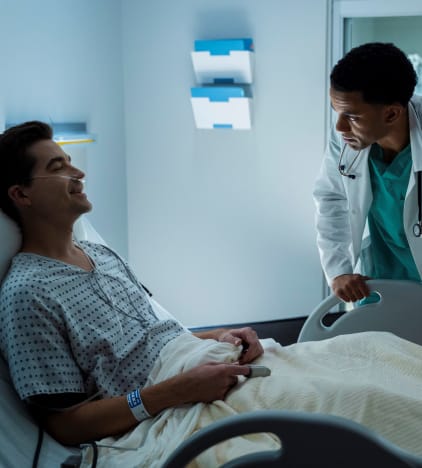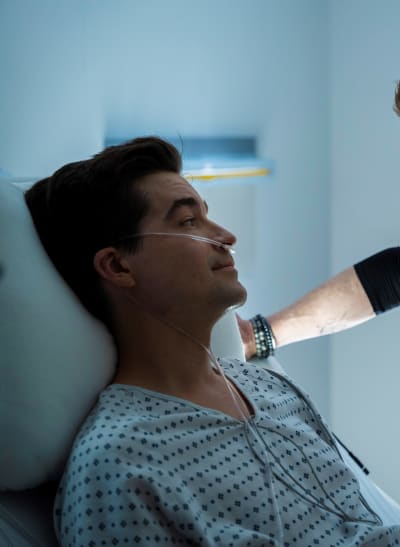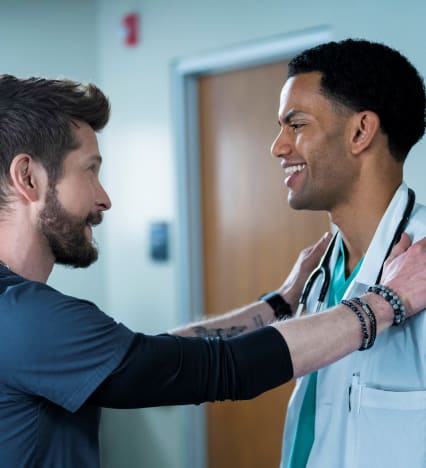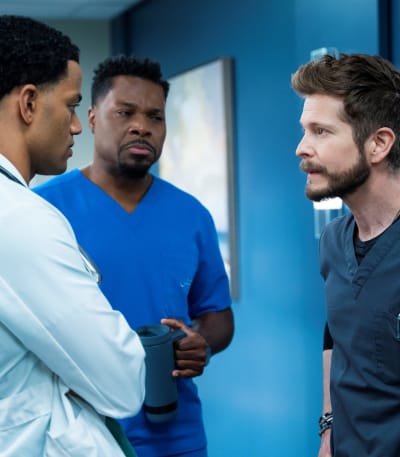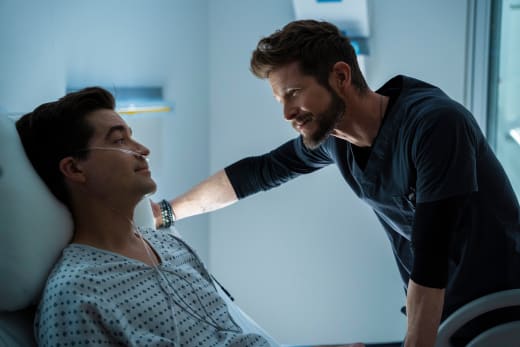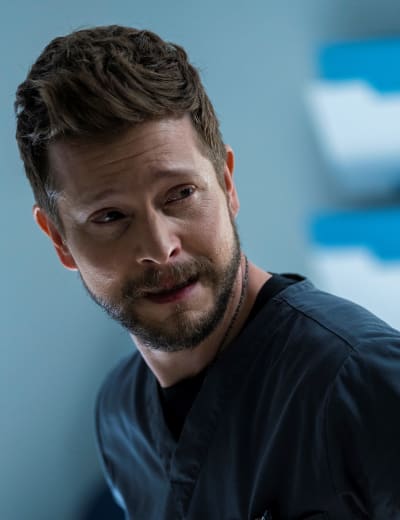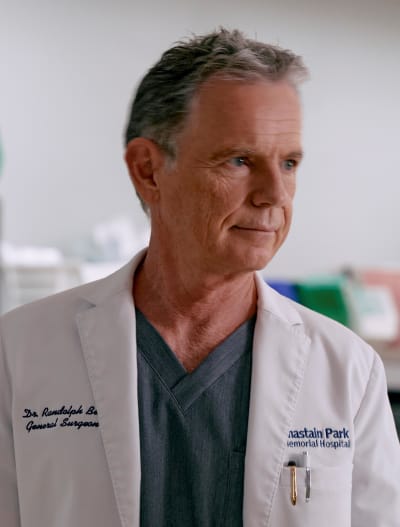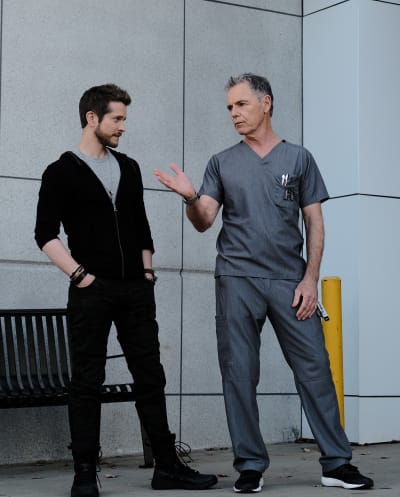It may be another polarizing hour for many whose hackles are quickly raised by what some deem hamfisted political overtures.
However, The Resident Season 5 Episode 9 was a provocative hour where the doctors’ sacrifices, conflicts, strife, and humanity were on full display.
Time, choice, accountability, and morals were all routinely interwoven throughout the installment, and it made for an intense hour.
They weren’t exactly hiding that the theme of the hour coincided with the specific brand of burnout that medical staff has faced during and since the pandemic.
And the tragic Wyatt case was blatantly about several issues, including those who rely on social media misinformation, a narrow view of their religious and other belief systems, and a distrust of science and experts in favor of conspiracies.
You could even argue that the pacemaker, in this instance, was synonymous with vaccinations.
But while Conrad mentioned that he’d witnessed the similar behavior Wyatt exuded during the pandemic regarding COVID patients who still believed the thing they were dying from was a hoax, they let the audience infer the parallels without any further mention.
It still wasn’t as subtle as the typical route of the show, but it also wasn’t as heavy-handed as The Resident Season 5 Episode 8 was.
The start of the hour perfectly laid the foundation for its thematic approach.
Kit is the best CEO Chastain could dream of having, but the woman is burnt out and constantly pulling all-nighters. She doesn’t have any off time, making her job of running Chastain a neverending one.
Kit never gets to clock out. And since she got the position, there isn’t a time when she isn’t on her way someplace, leaving somewhere else, putting out fires, or addressing new challenges. She’s as exhausted as it gets, sleeping in the office while mulling over paperwork.
The beauty of her relationship with Bell, who also held the position, is that he takes care of her while she’s struggling with the simple task of slowing down and self-care.
The Raptor has been throwing himself into, well, women (to my shallow pleasure), riding the high of his success and burying his feelings about his mother. But the demands of TV appearances, the job, and his mother’s declining health remind him that there isn’t enough time in the day when he’s pulled in so many directions.
I wish I could engage. If there were 28 hours in the day, I would gladly wax poetic with the patient about the benefits of the pacemaker, but I do not have the time. I have way too many patients who would kill for an easy cure. I have too many obligations.
AJ
Conrad jumping feet first back into his job at Chastain while balancing single fatherhood had him falling into little routines like making the same breakfast every day and forgetting grocery shopping.
And Devon’s one day off that should’ve been devoted to meeting the deadline for his grant proposal became a hectic one where he got pulled into a million directions.
The opening nailed the everyday chaos that comes with their lifestyles, and it carried into the rest of the installment, where a hectic day only compounded the norm.
One sympathized with Devon. It was his day off, and he couldn’t break free from the clutches of the ER.
Kit assigned him to find a suitable doctor for the department in his stead, and the interviewees were concerned in many ways.
The first applicant gave the impression that he was too much of a bottom-line person who would put numbers and figures ahead of people. You already knew where it would head when he started proposing how to use the ER to make more money off of patients.
And the former oncologist, set in his ways too much, looking to escape the dredges of sadness from that field, was a problem waiting to happen.
But as Devon said, it highlighted the burnout in the medical field across the board, and as much as he wanted to judge the men who applied, he couldn’t say he wasn’t that different from them.
It’s something they’re all facing. And what do you do about that? How do you rectify that issue?
Everyone is overworked and has pushed themselves past their limits, and there isn’t even enough time for them to take care of themselves the way needed.
Kit enlisted the help of Padma in scenes that proved levity while still hitting the point home. Her line about AJ’s limited flexibility was priceless.
Conrad was back on Trevor duty, and you sensed from the moment he walked in that he intended the day to be one of lessons, but neither of them foresaw in what ways.
The interns are an amusing bunch, as they all discussed how their superiors react to them. Trevor is hyped about performing big things instead of working himself up to them or giving the everyday interactions and treatment of patients who don’t have glamorous and exciting diagnoses the attention they deserve.
I am judging people for not loving medicine enough while trying to cut down on clinical time to go do research. I think about being in the ER year after year after year, with no outlet for research, and I don’t know how we don’t drown in the sickness, the sadness, the pressure, the paperwork. Half my med school class isn’t doing this anymore. That means something.
Devon
But the focus on a patient who needed suture wounds quickly went to Wyatt, who was painstakingly like someone we all know, whether it’s a relative, a friend, coworker, or mere acquaintance.
Wyatt’s Sarcoid-related heart blockage had him passing out and causing scary accidents, thus jeopardizing the lives of those around him. And the treatment was as simple as getting a pacemaker.
Under any other circumstance, Wyatt’s outpatient procedure would’ve been a blip on the radar for Conrad, Trevor, and AJ.
But Wyatt’s refusal to get the procedure based on a litany of things from his self-professed luck, to his faith in God, and to misinformation he received about harmful metals off of Facebook led to an entire day of Trevor and Conrad attempting to convince him to get a pacemaker to no avail.
Wyatt could’ve walked out of the hospital in an hour tops, but instead, he died there.
It seemed Wyatt’s beliefs changed by the second as he wavered from luck to God and the almighty Facebook, and typically it would be worth noting that it was needless sporadic. Here, it captured how Wyatts come across to those who don’t share similar stances or persona.
Wyatt stubbornly held fast to his beliefs until his dying breath, no matter what efforts Conrad or Trevor put into convincing him that he should get that pacemaker.
And they pulled out all the stops, including things that they probably should not have. The only way that this storyline didn’t head in a direction that was a disservice to both sides was if Trevor and Conrad succeeded in getting Wyatt declared incompetent and forced him to have this procedure or Trevor magically change his mind in the end.
Conrad: Those posts aren’t truthful, Wyatt. They’re propaganda by unqualified people who have politicized medicine. They want to sell distrust in science, they use snake oil.
Trevor: The real truth, Wyatt? Bad metal is not a thing. Dr. Hawkins is who you want giving you advice, he’s an actual expert.
Wyatt: I form my own opinions, OK? You have yours.
Trevor: This isn’t an opinion. It’s fact versus fiction, you understand?
As annoying as it was to listen to Wyatt’s irrational beliefs, it was unreasonable that they brought in a psychologist to talk to Wyatt.
Under the guise of Wyatt’s belief in something otherworldly, they hoped they could have him deemed unfit to make decisions, and it would’ve been a clusterf*ck if they managed to pull that off.
Regardless of how you feel about faith and people’s interpretations of it, belief or faith itself shouldn’t get undermined that way.
The case played out precisely as it should have with Conrad choosing the right approach to convince Wyatt to get the procedure, Trevor pushing for more extreme measures that would’ve jeopardized the hospital and Wyatt’s agency, and Wyatt dying.
Conrad: I’m as frustrated as you are. As doctors, our purpose is to help, and you got that part right, but Wyatt needs to want to be helped.
Trevor: Well, until he’s dead, I’m not giving up.
Conrad: And neither am I.
Wyatt got the uphold his beliefs, but at what cost? His life. The sanctity of his rights and beliefs were kept intact, to the frustration of Trevor and the heartbreak of Conrad, but it’s how the system should work.
And Trevor got a harsh lesson that he needed to learn with this case. Trevor is too arrogant and passionate for his own good, and sure, it doesn’t present itself favorably, and it turns people off, but it’s something realistic and human about that.
His desperation prompts him to question and challenge things. He always thinks he knows better, and if not reined in, he’ll always go too far.
He knew Conrad was the renegade of the hospital, but interestingly, this is where Conrad knew he had to walk the line carefully so he could show Trevor what that entails.
Because, of course, Conrad is a rogue, but we all know he’s one with purpose and reason, and he blurs the lines but knows he has to still operate within the confinements of rules and laws to keep fighting another day
While tempting, Conrad couldn’t indulge Trevor. It would’ve cost Wyatt, the hospital, and both of their medical licenses.
Trevor is passionate, impulsive, and green. Despite what we’ve learned about his path to Chastain, it still doesn’t click for him that if he indulges every self-righteous urge of his, he won’t get to be a doctor long enough to save people or make any difference.
Trevor’s sacrificing the future of many for instant, righteous gratification during a moment. He needs to learn how to see the bigger picture and how these small actions now have ripple effects that change everything later.
The final scene with Conrad, Wyatt, and Trevor was as frustrating as it was heartbreaking.
Conrad removing that barrier, clinging to Wyatt, and making his last-ditch plea to help was such a well-done scene, and Czuchry killed it yet again and guest star George Hampe was incredible, too.
It made you think about the parable, and Conrad’s argument was sound, and one often used to reason with people who invoke God during these instances.
If God gave us common sense, and will, and abilities, then why not trust that? Like two boats passing by when a man of faith is damn near drowning, who’s to say that God didn’t send Conrad, Trevor, and AJ?
What if they were the signs and the help?
The effects of Wyatt’s death on both Conrad and Trevor made you want to reach through the screen and hug both of them. Czuchry and Fowler brought the tears and evoked them during that scene.
Trevor’s first death will be a memorable one. It’s probably the most realistic one he could have.
It dispelled the thought that it’d be something ripped from a movie, this perfect scenario where they tried relentlessly to save a person, but the stars didn’t align.
Please let me save you, Wyatt. I have everything you need, you just say the word. Think of all the beautiful things you’ll never be able to experience again. I don’t know what happens after you die, but I bet you don’t get to kiss a woman and know you want to be with her for the rest of your life. Don’t you want to wake up on the first day of Fall and eat a peach? Laugh your ass off with your best friends. You don’t have to give up any of that. Think of how lucky that makes you.
Conrad
Wyatt’s death felt like the harsh reality of practicing healthcare, and these are the moments that ground Trevor and his notions of what practicing medicine is about, but also, he’s on the side now where he’s keen on the bureaucracy of it all. He’s not a special snowflake who reinvented the wheel with his line of thinking.
It’s a system that demands all of them to work within its confinements. When humans are a factor in anything — there’s no guarantee things will play out as anticipated.
I appreciated that Conrad taught Trevor the tough lesson, but he still had a moment of questioning if he did the right thing. He was tempted to do something too.
But just as he shared the rest of the case Trevor cited, there was never a guarantee that Wyatt would have survived and been thankful for what they did if they forced it. If anything, he could’ve been pissed or sued them and the hospital.
Conrad: He’s your first death.
Trevor: Yeah, not how I imagined it going down.
Conrad: You pictured a different kind of heroism. Blood spattered all over your white coat.
Trevor: Do you ever get used to it?
Conrad: It never gets easier, it’s just different. Today was no small accomplishment, Dr. Daniels. We allowed him to live and die according to his principles and because of that, we managed to keep ours.
Leela’s case was the perfect foil to Conrad and Trevor’s with Wyatt. While Trevor wished he had unilateral power over Wyatt’s healthcare, Leela felt the pressure of that power with Britt.
Britt’s placing the responsibility on Leela to decide the best route for her had Leela feeling the weight of her decision-making. It’s terrifying to know that whatever you choose could be life or death for someone.
Sure, she’d have some glory if things went well, but she’d carry the responsibility if something went all wrong, too, and there’s the chance that Britt or her family would have assigned blame if things didn’t work out favorably.
Leela had no patience for Britt at first, but it was another sign that they’re overworked. Initially, she didn’t have the time to listen to Britt’s indecisiveness.
AJ: I’m not a man for Child’s Pose, so I’m just going to be on my way to-
Padma: AJ, I happen to know from personal experience that you could really benefit from a little extra flexibility.
She was flitting from Britt’s room to surgery and so forth.
But Leela’s shining moment was how well she took over and essentially performed a solo surgery without Bell’s aid in the clutch. Her wavering confidence in making the decision for Britt transformed to a steely resolve during the operation, even in the face of Jessica second-guessing her.
It was a well-earned moment for Leela.
Of course, the downside to Leela operating solo was that Bell’s reasoning for backing out was concerning.
Something is going on with him, and I, for one, am not okay with it.
Can we please leave Bell alone? We have already lost Nic, Carol is dying, and I’m not emotionally prepared for MJW coming for us with his performance when that happens. My heart cannot bear anything else!
Bell noticed that his hand tremor was possibly back when he almost spilled Kit’s coffee, and he spent the rest of the day massaging at his knuckles and joints.
But the most concerning display was how his vision blurred, and he looked like he may have passed out during surgery. With his hands seeming to lock up, all of that suggests that something else is going on with him.
Bell’s growth is in him stepping back from surgery instead of going along with it and pretending he wasn’t having difficulties. I’ve loved how they keep making callbacks to his early days and expressing how he’s evolved since then.
Something isn’t right with Bell, and he’s enlisted Conrad to figure it out.
I’ll save you more waxing poetic about the fantastic trajectory of their relationship or even the subtle but amusing moment when Bell implied that Trevor was giving it to Conrad as well as he did him.
But he trusts Conrad to figure out what’s happening to him without others knowing. You could see the weight of that on Conrad. As smoothly as Bell mentioned it, seemingly covering up his anxiety about the ordeal, you could see Conrad reeling.
He’s already lost so much, and he can’t afford to lose anything or anyone else, and you could see that flash of worry in his eyes as he agreed.
Over to you, Resident Fanatics. What’s wrong with Bell? What are your thoughts on the themes of this episode? Are you warming up to Trevor? Hit the comments.
You can watch The Resident online here via TV Fanatic.
Jasmine Blu is a senior staff writer for TV Fanatic. Follow her on Twitter.

